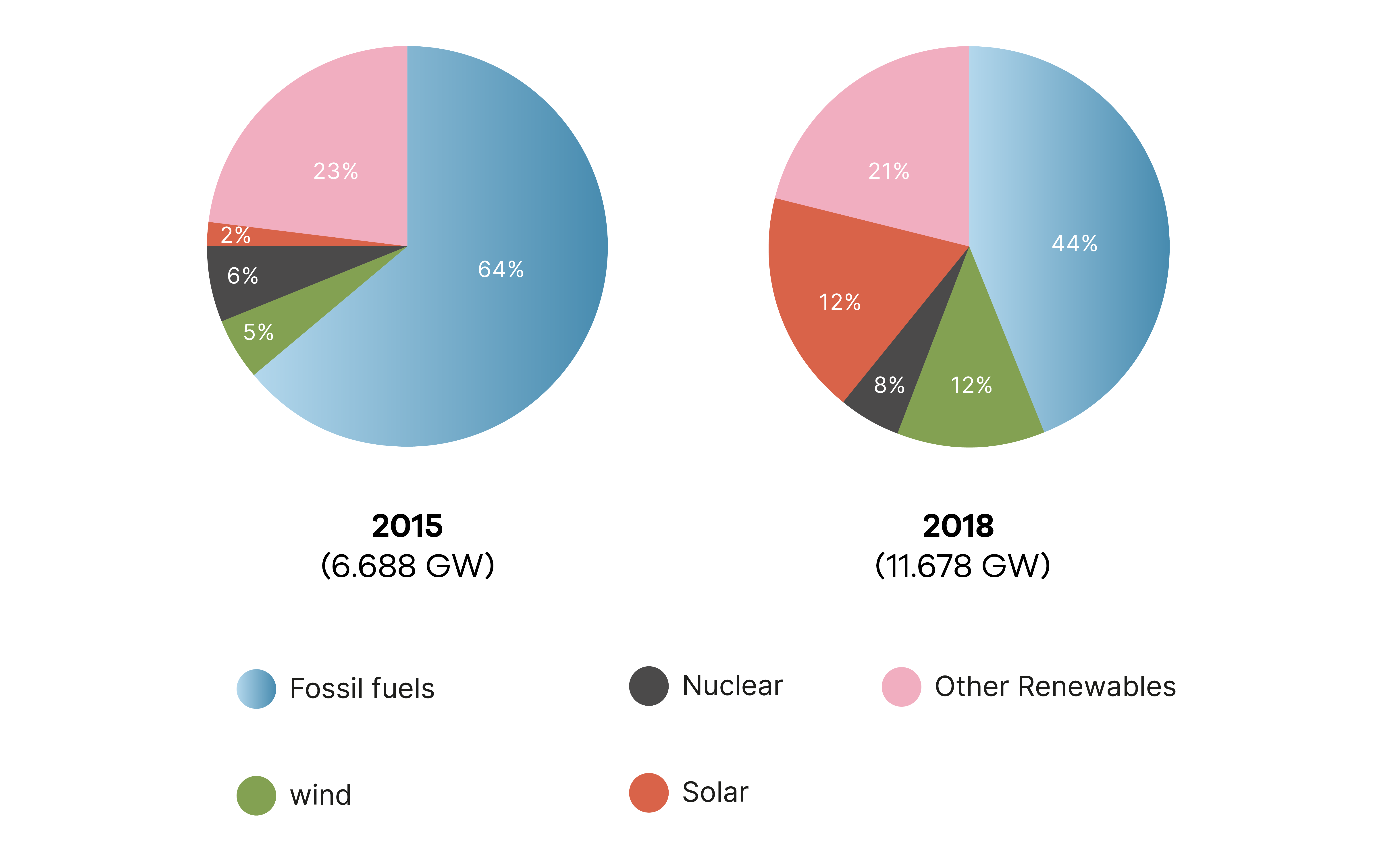IELTS Writing Samples topic Energy and Environment có thể được xem là tương đối khó nhằn đối với phần lớn học viên do chúng ta thật sự không có quá nhiều kiến thức cũng như lượng từ vựng tương thích với chủ đề này. Nội dung bài viết này, IELTS Vietop sẽ giới thiệu một số từ vựng liên quan và bài viết mẫu để tham khảo.
IELTS Writing Task 1
| Task 1: The pie charts below compare the proportion of energy capacity in gigawatts (GW) in 2015 with the predictions for 2040. Summarise the information by selecting and reporting the main features, and make comparisons where relevant. |

Sample
The pie charts detail a comparison of the distribution of energy capacity in 2015 and the predicted figures for 2040, measured in gigawatts.
Overall, there will be a considerable transition towards renewable energy sources from 2015 to 2040, with wind and solar power significantly increasing their proportion of energy capacity. Although fossil fuels will remain the most important source of energy, their contribution is projected to decrease over the same time frame.
In 2015, fossil fuels accounted for 64% of the total, making up the majority of energy capacity. This was followed by other renewables at 23%, while wind and nuclear made up 5% and 6%, respectively. With only 2% of the total energy capacity, solar power was the smallest overall contributor.
Turning to 2040, there will be major changes in the contribution of energy sources. Most significantly, a far greater percentage (18%, a ninefold increase from 2015) is expected from solar power. With a 7% increase, wind energy will follow a similar trajectory. However, while other renewables will marginally decline to 21% of energy capacity, nuclear power will remain essentially stable at 5%. Despite a notable decline, it is estimated that 44% of energy capacity will continue to come from fossil fuels.
Voca
- Transition (n): sự chuyển đổi, chuyển dịch
- Smallest overall (adj): nhỏ nhất trên tổng thể
- Ninefold (adj): (gấp) 9 lần
- Similar trajectory (noun phrase): quỹ đạo tương tự
- Essentially stable (noun phrase): sự ổn định cơ bản
Xem thêm:
Cách viết IELTS Writing Task 1 từ A – Z cho người mới bắt đầu
Phân tích
Nhìn chung, nhiên liệu hoá thạch vẫn là nguồn năng lượng chính của cả hai năm cho dù có sự sút giảm. Bên cạnh đó, năng lượng từ gió và mặt trời được dự đoán sẽ có sự tăng rất đáng kể trong tương lai.
Lưu ý: Một hướng đi hiệu quả cho dạng bài hai bánh tương ứng với hai mốc thời gian là đoạn thân bài 1 viết về sự so sánh từ lớn xuống bé của các đối tượng. Qua bánh thứ 2 ở đoạn thân bài 2 thì viết lồng ghép vừa nêu xu hướng tăng giảm vừa nêu sự so sánh của các xu hướng đó; đặc biệt cần đa dạng cấu trúc so sánh và ngữ pháp.
Một số cụm, cấu trúc và ngữ pháp nhằm tạo sự đa dạng: “significantly increasing their proportion of”; “remain the most important”; “is projected to decrease”; “making up the majority of”; “With only 2% of…”; “a far greater percentage”; “a ninefold increase from”; “With a 7% increase”; “ follow a similar trajectory”; “marginally decline to”; “ notable decline”; “…44% of…”.
Xem thêm:
Hướng dẫn cách viết Pie chart – IELTS Writing Task 1
Bài mẫu IELTS Writing Task 1+2: Social Media
Cách viết dạng Multiple Graphs/Charts – IELTS Writing Task 1

Nhận tư vấn miễn phí khóa học hè
IELTS Writing Task 2
| Task 2: Many countries are experiencing serious problems with their environment, with pollution of their land, water and air. What are these problems and how might they be reduced? |
Sample
Environmental contamination of land, water, and air is a major global problem. The primary environmental problems that many nations are currently dealing with will be covered in this essay, along with some solutions regarding how to solve them.
There are some main environmental issues that numerous countries are now addressing. In many urban areas, air pollution generated by industrial activity and mass transportation is a significant problem. This pollution emits toxic chemicals such as carbon monoxide and nitrogen oxides, which can lead to respiratory illnesses including asthma and lung cancer.
Another major problem is water contamination generated by industrial waste, agricultural chemical runoff, and sewage. Finally, land pollution resulting from the inappropriate dumping of hazardous waste, trash, and plastics is also a serious issue. These activities produce a variety of pollutants that can contaminate land, air, and water supplies, damaging ecosystems and human health.
There are some solutions offered to manage this environmental pollution. Governments should promote the use of electric vehicles and public transportation, especially in metropolitan areas. Stricter rules on companies and investments in clean energy sources such as solar and wind power could also aid in the reduction of air pollution. To decrease water pollution, governments should adopt stronger controls on enterprises and farms and invest in more effective wastewater treatment facilities, as is the case in Japan and Singapore. Another solution is that citizens should be taught proper garbage disposal techniques and encouraged to limit their use of single-use plastics by recycling them in order to decrease land pollution.
In conclusion, environmental pollution is a serious problem that requires immediate action from both governments and individuals. The effects of air, water, and land pollution on human health and the planet’s ecosystems are devastating. By enacting stronger rules, investing in renewable energy, and promoting environmentally friendly activities, we can mitigate the severity of these environmental issues and build a sustainable future for all.
Xem ngay: Khóa học IELTS và luyện thi IELTS cấp tốc được nhiều bạn tại TPHCM theo học nhất – Cùng tìm hiểu ngay nhé
Voca
- Mass transportation (noun phrase): giao thông đông đúc
- Respiratory illnesses (noun phrase): bệnh về đường hô hấp
- Agricultural chemical runoff (noun phrase): chất thải hóa chất nông nghiệp
- Sewage (n): nước thải
- Hazardous (adj): nguy hiểm, nguy hại, gây hại
- Adopt stronger controls on (noun phrase): thực hiện/áp đặt kiểm soát chặt hơn đối với
- Single-use (compound adj): sử dụng một lần
- Enacting (gerund): ban hành,
- Mitigate (v): giảm thiểu, làm giảm bớt
- Build a sustainable future (noun phrase): xây dựng tương lai bền vững
Phân tích
Quan điểm: nêu ra các vấn đề về môi trường liên quan tới đất, nước và không khí, đồng thời đề nghị một số giải pháp để giải quyết vấn đề.
Vấn đề:
- Ô nhiễm không khí do hoạt động công nghiệp và phương tiện giao thông đông đúc gây ra.
- Ô nhiễm nước do chất thải công nghiệp, chất thải hóa chất nông nghiệp và nước thải sinh hoạt gây ra.
- Ô nhiễm đất do việc xả rác chứa chất thải nguy hiểm, rác thải và nhựa gây ra.
→ các loại ô nhiễm này đều gây ra vấn đề chung là phá huỷ hệ sinh thái và trực tiếp là sức khoẻ của con người.
Giải pháp:
- Chính phủ nên khuyến khích sử dụng xe điện và phương tiện giao thông công cộng. Các quy định nghiêm ngặt với các công ty và đầu tư vào các nguồn năng lượng sạch như năng lượng mặt trời và gió → giảm ô nhiễm không khí.
- Chính phủ nên áp đặt các quy định nghiêm ngặt hơn đối với các doanh nghiệp và trang trại, đồng thời đầu tư vào các cơ sở xử lý nước thải → giảm ô nhiễm nước.
- Công dân cần được dạy kỹ thuật xử lý rác thải đúng cách và được khuyến khích hạn chế việc sử dụng các loại nhựa dùng một lần bằng cách tái chế chúng → giảm ô nhiễm đất.
Xem thêm:
Cách viết Problem and Solution trong IELTS Writing Task 2
Xem ngay: Tổng hợp đề thi IELTS Writing 2023 kèm bài mẫu chi tiết
Thông qua bài viết chắc hẳn các bạn đã có cho mình thêm những kinh nghiệm và cách hoàn thiện IELTS Writing Samples topic Energy and Environment. Nếu các bạn có thắc mắc hoặc có những đề tài thú vị khác thì có liên hệ với chúng tôi, IELTS Vietop sẽ luôn cố gắng để hỗ trợ bạn tốt nhất.

![[ACE THE TEST] Giải đề IELTS Writing ngày 20/07/2024 3 [ACE THE TEST] Giải đề IELTS Writing ngày 20/07/2024](https://www.ieltsvietop.vn/wp-content/uploads/2024/07/giai-de-ielts-writing-ngay-20-07-2024.jpg)
![[ACE THE TEST] Giải đề IELTS Writing ngày 11/07/2024 4 giai de ielts writing ngay 11 07 2024](https://www.ieltsvietop.vn/wp-content/uploads/2024/07/giai-de-ielts-writing-ngay-11-07-2024.jpg)
![[ACE THE TEST] Giải đề IELTS Writing ngày 06/07/2024 5 giai de ielts writing ngay 06 07 2024](https://www.ieltsvietop.vn/wp-content/uploads/2024/07/giai-de-ielts-writing-ngay-06-07-2024.jpg)
![[ACE THE TEST] Giải đề IELTS Writing ngày 22/06/2024 6 [ACE THE TEST] Giải đề IELTS Writing ngày 22/06/2024](https://www.ieltsvietop.vn/wp-content/uploads/2024/06/giai-de-ielts-writing-ngay-22-06-2024.jpg)
![[ACE THE TEST] Giải đề IELTS Writing ngày 15/06/2024 7 [ACE THE TEST] Giải đề IELTS Writing ngày 15/06/2024](https://www.ieltsvietop.vn/wp-content/uploads/2024/06/giai-de-ielts-writing-ngay-15-06-2024.jpg)
![[ACE THE TEST] Giải đề IELTS Writing ngày 08/06/2024 8 [ACE THE TEST] Giải đề IELTS Writing ngày 08/06/2024](https://www.ieltsvietop.vn/wp-content/uploads/2024/06/giai-de-ielts-writing-ngay-08-06-2024.jpg)
![[ACE THE TEST] Giải đề IELTS Writing ngày 01/06/2024 9 [ACE THE TEST] Giải đề IELTS Writing ngày 01/06/2024](https://www.ieltsvietop.vn/wp-content/uploads/2024/06/giai-de-ielts-writing-ngay-01-06-2024.jpg)
![[ACE THE TEST] Giải đề IELTS Writing ngày 25/05/2024 10 [ACE THE TEST] Giải đề IELTS Writing ngày 25/05/2024](https://www.ieltsvietop.vn/wp-content/uploads/2024/05/giai-de-ielts-writing-ngay-25-05-2024.jpg)


